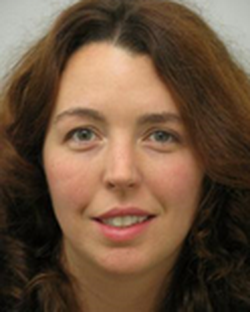Carrie Grimes

Carrie Grimes
Carrie Grimes is a Distinguished Engineer at Google, working on data driven resource planning, cost analysis, and distributed cluster management software as part of the Technical Infrastructure group. She spent many years leading a research and technical team in Google Search trying to figure out what criteria make a search engine index "good," "fast," and "comprehensive" - and how to achieve those goals. Currently, she is the Technical Lead for resource planning, pricing, and management data/software in Technical Infrastructure.
Career

" Carrie Grimes Bostock: Making smarter searches affordable"
Since October 2014 she has been a Distinguished Engineer at Google.
She uses Statistical modeling to help improve the company’s search technology.
For example, she worked on an algorithm to fine-tune Google’s web crawler, which roams the Web to constantly update its search index. The model increased the chances that the crawler would scan frequently updated Web pages and make fewer trips to more static ones. The goal, she explained, is to make tiny gains in the efficiency of computer and network use.
“Even an improvement of a percent or two can be huge, when you do things over the millions and billions of times we do things at Google"
Since June 2003 she has been a Principal Engineer for Data analysis, Algorithms and Search Infrastructure at Google in Mountain View / San Francisco.
From 1999 to 2003 she was a PhD student at the Stanford University.
Education

"Carrie Grimes, Google - Stanford Women In Data Science 2015 - #WiDSConference #theCUBE"
From 1998 to 2003 she studied at the Stanford University and received a PHD in Statistics.
Between 1994 and 1998 she studied at the Harvard University and received an A.B. in Anthropology. She ventured to places like Honduras, where she studied Mayan settlement patterns by mapping where artifacts were found. But she was drawn to what she calls “all the computer and math stuff” that was part of the job.
“People think of field archaeology as Indiana Jones, but much of what you really do is data analysis"
Publications
"Availability in Globally Distributed Storage Systems"
"Using a Market Economy to Provision Compute Resources Across Planet-wide Clusters"
"Estimation of Webpage Change Rates"
"Keeping a Search Engine Fresh: Risk and Optimality in estimating refresh rates for web pages"
"Assigned tasks are not the same as self-chosen web search tasks."
"Query logs alone are not enough"
"Microscale Evolution of Web Pages"
"Image Manifolds which are Isometric to Euclidean Space"
"On Image Manifolds which are Isometric to Euclidean Space"
"Hessian Eigenmaps: New Locally Linear Embedding Techniques For High-Dimensional Data"
"New Methods in Nonlinear Dimensionality Reduction"
"When does geodesic distance recover the true hidden parametrization of families of articulated images?"









